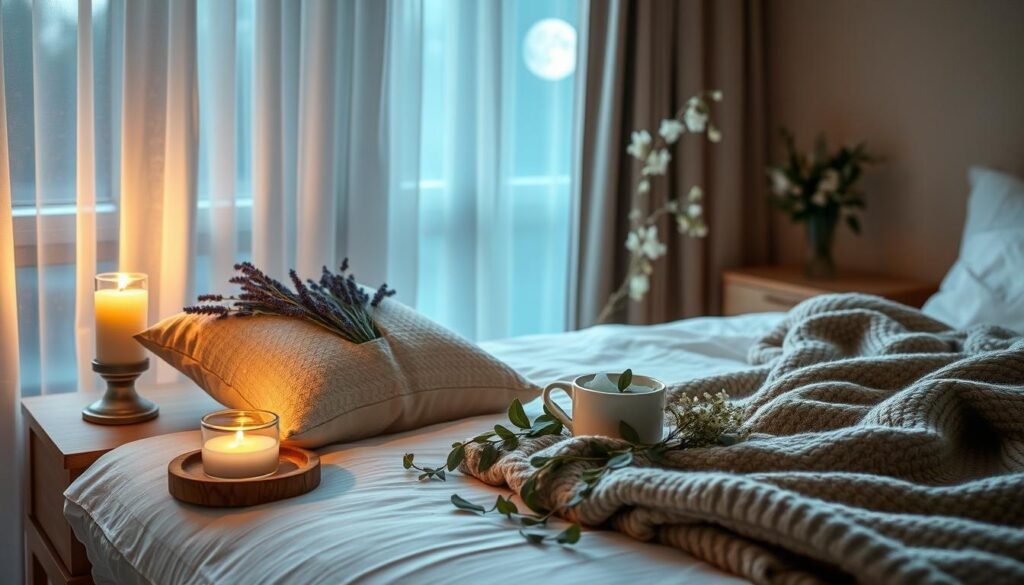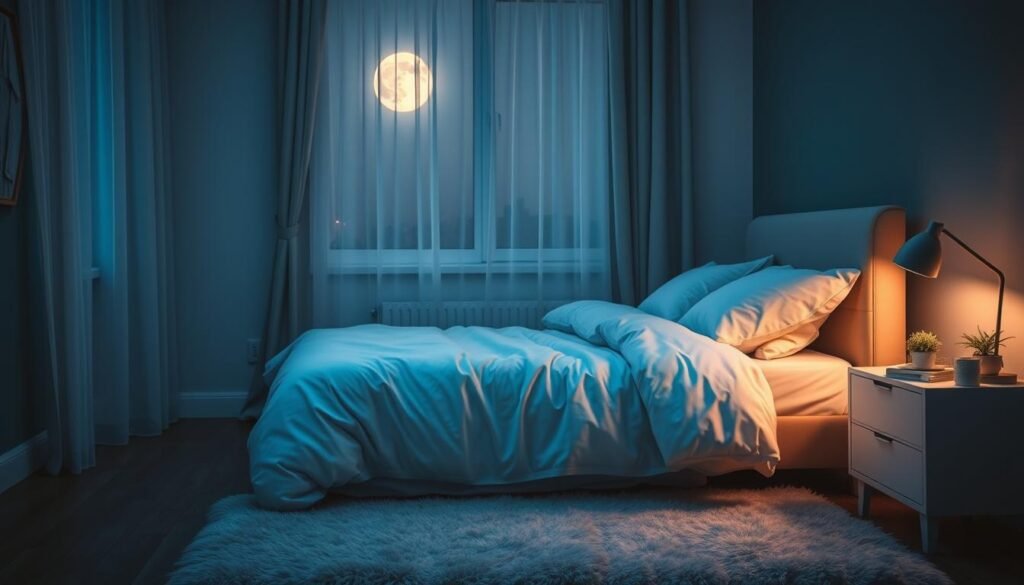Did you know that almost half of adults struggle to sleep because of stress? This fact shows how common anxiety insomnia is. People can’t sleep well due to their anxious thoughts, hurting their overall mental health.
Many things can cause anxiety insomnia, like constant worry and being too alert. It’s essential to know what triggers this issue to deal with it properly. This article will help you understand anxiety insomnia better. It offers insights into its causes, effects, and how to find relief.
By seeking help and employingeffective strategies, you can overcome sleep problems. This will help improve your mental health and lead to better sleep.
Key Takeaways
- Anxiety insomnia affects a significant percentage of the adult population.
- Common symptoms include trouble falling asleep and frequent awakenings during the night.
- Relaxation techniques like deep breathing can help mitigate symptoms of anxiety insomnia.
- Lifestyle changes, including consistent sleep schedules, can enhance sleep quality.
- Cognitive Behavioral Therapy (CBT) is one of the most effective treatments for anxiety-related insomnia.
Understanding Anxiety and Insomnia
Anxiety insomnia comes from a mix of many factors. It hits people with anxiety, making sleep hard. Understanding why it happens helps us find good ways to manage stress and boost mental health.
What Causes Anxiety Insomnia?
Many things cause anxiety insomnia, like stress, health issues, and how we live. People with anxiety often find it hard to sleep. Doctors usually ask these patients about their sleep. Sleeping poorly makes people more stressed, due to high cortisol levels.
This stress hormone is closely tied to anxiety.
The Stress Response Relation to Sleep
Stress messes with our sleep. High stress can make our sleep pattern go haywire, leading to anxiety insomnia. This can make us less motivated, moody, and irritable. Good sleep is key to handling tough emotions and staying mentally healthy.
Tackling both anxiety and insomnia can involve things like changing behaviors, therapy, and meds.
| Factor | Description |
|---|---|
| Stress | High stress levels can disrupt sleep patterns and make anxiety insomnia worse. |
| Medical Conditions | Issues like chronic pain and hyperthyroidism can lead to sleep problems. |
| Lifestyle Choices | Bad habits, like irregular sleep or too much screen time, can spoil sleep quality. |
| Cortisol Levels | Not sleeping enough can raise cortisol, increasing anxiety. |
| Therapeutic Options | Changes in behavior and therapy can reduce anxiety and help with sleep. |
The Vicious Cycle of Anxiety and Insomnia
Anxiety and insomnia are trapped in a tough cycle that’s hard to escape. People with anxiety struggle to sleep. This lack of sleep feeds their anxiety, causing more sleep problems. Both anxiety and sleep issues get worse, needing immediate help to improve health.
How Anxiety Triggers Insomnia
Anxiety makes the body too alert to sleep. Worrying thoughts keep people from sleeping. About 30% of adults have insomnia symptoms, and under 10% suffer from chronic insomnia. Chronic stress makes anxiety and insomnia more likely, creating a harmful cycle.
The Impact of Insomnia on Mental Health
Not sleeping enough harms mental health. It makes anxiety worse and lowers brain function. This affects thinking and concentration. Insomnia increases the risk of anxiety and depression. Many with chronic insomnia may develop these problems. Addressing sleep issues early helps. Stress-management techniques can break this harmful cycle.
Effective Stress Management Techniques
Managing stress is key to dealing with anxiety and insomnia. Effective strategies can help you control your sleep again. Relaxation and mindfulness are great ways to handle stress that keeps you awake.
Importance of Relaxation Techniques
Relaxation methods can greatly ease stress, leading to better sleep. They result in a slower heart rate and better blood flow. This improves your health overall.
Some top relaxation methods are:
- Deep breathing exercises
- Yoga and tai chi
- Progressive muscle relaxation
- Visualization and meditation
- Aromatherapy
Regularly using these methods makes your mind calmer and gets your body ready for sleep. You’ll feel less tired, your muscles will relax, and you’ll be able to focus better.
Mindfulness Practices for Better Sleep
Mindfulness lets you notice your thoughts without judgment, easing anxiety at bedtime. This helps create a peaceful setting for sleep. Adding these mindfulness techniques to your night routine can be helpful:
- Writing down your thoughts and worries before sleeping
- Following guided sleep meditations
- Doing mindful breathing exercises
- Conducting body scans to relax
Adopting mindfulness practices helps you stay calm, leading to a more restful sleep. This commitment improves your ability to tackle insomnia.

| Relaxation Techniques | Benefits |
|---|---|
| Deep Breathing | Reduces anxiety and promotes tranquility |
| Yoga | Enhances flexibility and relieves tension |
| Progressive Muscle Relaxation | Decreases muscle tension and relaxes the body |
| Aromatherapy | Induces relaxation through calming scents |
| Meditation | Fosters mental clarity and emotional balance |
Natural Remedies for Anxiety Insomnia
Managing anxiety-related insomnia can be done through natural remedies. They focus on diet and nutrition. Changing your diet helps improve sleep quality. Adding certain foods might make a big difference in how well you sleep.
Diet and Nutrition Tips for Improved Sleep
What you eat affects how you sleep. Here are some diet and nutrition tips:
- Reduce caffeine intake, especially in the afternoon and evening.
- Avoid heavy and rich meals close to bedtime.
- Consider foods rich in tryptophan, such as turkey, chicken, and dairy, which can promote sleepiness.
- Incorporate magnesium-rich foods like nuts and seeds to help with relaxation.
Knowing how to change your diet can help with sleep disorders. It lets you take charge of your sleep. For tips on improving sleep naturally, check out this resource.
Herbal Remedies and Supplements
Herbal remedies are popular for dealing with sleep problems. Some good supplements include:
| Herb/Supplement | Potential Benefits | Notes |
|---|---|---|
| Valerian Root | May reduce time to fall asleep | Generally well-tolerated but can cause mild side effects. |
| Chamomile | Promotes relaxation | Calming effect may not be enough for serious insomnia. |
| Melatonin | Enhances sleep quality | Doses of 0.1 to 0.3 mg are often effective. |
| Lavender | Improves sleep when taken with antidepressants | Also reduces anxiety. |
When trying natural remedies, always talk to a healthcare provider. This is crucial if you have chronic insomnia. It could mean you have a more serious problem. Combining diet and nutrition changes with herbal remedies can help you sleep better.

Sleep Hygiene: Creating a Restful Environment
Good sleep hygiene is crucial for people dealing with sleep issues, like anxiety insomnia. A bedroom set up for sleep helps improve how well you sleep. Minor changes can greatly affect your sleep, making it more regular and refreshing.
Preparing Your Bedroom for Sleep
Creating a comfy bedroom means controlling the environment. You should look at:
- Temperature: Keep your sleep space cool, around 60 to 67°F, for the best sleep.
- Lighting: Use blackout curtains to stop outside light from disturbing your sleep. This helps your body produce melatonin.
- Noise: Keep it quiet. If you can’t, try a white noise machine.
- Furniture: Choose a comfy mattress and pillows for a good night’s sleep.
Have a regular bedtime routine to make your body ready for sleep. Cut down on using screens before bed to avoid blue light, which can mess with your sleep.

Establishing a Consistent Sleep Schedule
It’s key to sleep and wake up at the same time every day. It helps your body clock and fights daytime tiredness. Getting sunlight in the morning and less light at night also helps sleep better.
Try calming activities like reading or meditation before bed. This helps you fall asleep. Regular exercise is good for your health and helps your natural sleep cycle. Small changes can improve your sleep and health.
For anxiety management tips, learning breathing exercises can help. They improve emotional well-being and health. Find effective breathing techniques here.
Cognitive Behavioral Therapy for Insomnia
Cognitive Behavioral Therapy (CBT) is a top choice for treating anxiety insomnia. It targets the behaviors and thoughts that mess up sleep. Through practical techniques, CBT helps folks master their sleep issues.
Understanding CBT for Anxiety and Sleep
CBT shines when dealing with persistent sleep troubles like insomnia. It changes daily habits, creates sleep schedules, and betters where you sleep. People learn how to relax and sleep well which helps cool down anxiety and beats insomnia. A big chunk, 70% to 80%, see their sleep get better with CBT.
Techniques to Change Sleep-Disruptive Thoughts
At CBT’s heart lies cognitive restructuring, which flips negative sleep thoughts to positive. It teaches that anxiety insomnia is manageable by changing how we think. Sleep restriction methods also set strict bedtimes, making you more eager to sleep. This urge to sleep improves after 6 to 8 sessions, showing gradual but real progress. This slow improvement beats the quick fixes sleeping pills promise.
Physical Activity and Its Role in Sleep Health
Getting regular exercise helps improve sleep health. Studies show that 30 minutes of moderate exercise can make sleep better that night. Exercise helps lower stress and boosts hormones that regulate sleep.
How Exercise Improves Sleep Quality
Exercise helps you sleep in several ways. After working out, your body cools down, making you feel sleepy 30 to 90 minutes later. The best time to exercise can vary. Some sleep better exercising 1 to 2 hours before bed, while others may choose different times.
Finding an enjoyable activity, like power lifting or yoga, makes it easier to stick with it. A study with 64 college students showed exercise improves mood and overall emotional health, not just sleep. To learn more about exercise and sleep, visit this resource.
When to Seek Professional Help
If you’re struggling with anxiety and insomnia, you might wonder when to get professional help. It’s critical to recognize certain signs that suggest it’s time to consult someone. This is especially true if sleep problems start to mess with your daily life.
Signs That You Should Consult a Professional
Knowing when to seek professional assistance is key in handling anxiety insomnia. Here are the main signs:
- Persistent insomnia lasting more than a few weeks
- Trouble with daily tasks because of sleep loss
- Increase in anxiety affecting work or personal life
- Physical issues like fatigue, irritation, or mood changes
- Waking up often at night or difficulty sleeping again
Different Treatment Options Available
When you decide to get help, there are many treatments to consider. The most common include:
- Cognitive Behavioral Therapy (CBT): This method can be as effective as medication. It focuses on changing the thoughts and actions that hurt your sleep. This includes learning to control your environment and how to relax.
- Medications: Doctors might prescribe sleep aids depending on what you need. But it’s important to be careful with them to avoid becoming dependent.
- Alternative Therapies: Techniques like meditation, yoga, and some supplements can help. However, it’s best to talk with a healthcare provider before trying new treatments.
Conclusion
Anxiety insomnia is a big problem. It hurts mental health and well-being. The link between anxiety disorders and trouble sleeping is complex but crucial to understand. Studies show that 24% to 36% of people with insomnia also have anxiety disorders. This includes generalized anxiety disorder and panic disorder.
To fight these sleep problems, effective stress management is key. Healthy life choices also make a big difference. Using natural methods and cognitive behavioral therapy (CBT) helps a lot. They can make sleep better and control anxiety disorders. With support from friends and experts, people can overcome endless nights.
Good sleep is very important for mental health. Knowing the signs of anxiety insomnia and how to deal with it helps. This way, people can improve their sleep. This leads to a healthier mind and a better life overall.